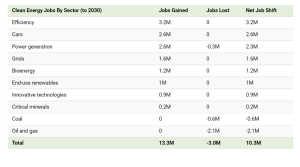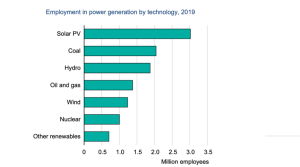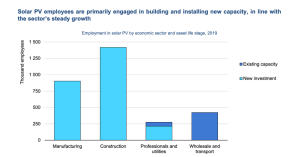Green jobs are among the fastest-growing and the most resilient in the European economy. Solar power, for example, is set to become Europe’s main source of energy before the end of the decade. This could lead to the creation of 4 million jobs across Europe by 2050.
In the US, green jobs are expected to expand to nearly 24 million, comprising 14% of total US jobs by 2030. Since President Joe Biden signed into law the Inflation Reduction Act in August 2022, more than 100,000 clean energy jobs have been created across the country.
The European Union’s push to improve energy efficiency in buildings and reduce the amount of fossil fuel they consume could create 160,000 jobs in the energy and heating sector alone by 2030. Given the skills shortage, however, there is a question of who will fill these positions.
The green jobs opportunity
While pushing its climate ambition, the European Green Deal (EGD) is a clear booster of jobs and economic development across all industrial and economic sectors. This means that the successful implementation of the EGD relies on the availability of qualified professionals.
Employment has grown in areas such as energy efficiency of buildings, pipe insulation, recycling and innovative renewable technologies, even during the COVID-19 crisis. However, it’s likely that not every sector will see a net gain in employment by the end of the decade.

As can be seen from the visual above, the largest job gains are expected to occur in electrical efficiency, power generation and the automotive sector. Combined with modernising the grid, they make up 75% of the 13.3 million in new job gains expected.
New energy sources, such as bioenergy and end-use renewables, and supply chain resources, such as innovative technologies and critical minerals, will likely create 3.3 million jobs (25% of the total). On the other end of the spectrum are the 2.7 million fossil fuel jobs expected to be lost.
Considering the current energy context, green jobs are among the fastest growing across the globe. The solar power industry, for example, accounts for the highest number of employees in power generation (see graph below).

While the highest share of solar jobs is associated with the manufacturing and construction phases (see graph below), the solar power industry could lead to the creation of 1 million jobs across Europe alone by 2030, as PV (solar photovoltaic) power generation is set to become one of the main sources of energy in the world.

Additionally, if labour markets have learned anything from their historical evolution, it’s that economic transitions (and energy ones more specifically) have always created new ecosystems. The energy transition leads to a less labour-intensive operating industry and that is an important and positive evolution, as jobs also translate into higher costs. Thus, lower costs of renewables are also explained through a reduced number of operation-related jobs. In other words, as it happened for centuries, efficiency on one side, innovation and technological progress on the other, have led to lower labour intensity for existing economic sectors (energy sector) and to more new jobs for new economic sectors (tech sector).
The overlapping crises of the past years have urged European decision-makers to take more decisive actions in dealing with the climate emergency, the most difficult crisis of them all. To this end, the success of Europe’s ambitious climate goals will depend on the availability of qualified professionals, which will call for a substantial transformation of labour markets.
But the labour markets have always been dynamic, as jobs kept adapting to technological innovations while aiming to fit the needs of communities and society at large. And, while today a less labour-intensive energy generation sector is emerging, new job opportunities and labour ecosystems are unlocked, which will shape the long-term plans of countries.
Despite the unprecedented challenges associated with this transformation and the need to accelerate the energy transition, which pose high risks to our capacity to reskill, upskill and bring proper competence in these sectors, this new green economy paradigm also brings unmatched potential to properly plan for a sustainable evolution of our professional duties.
The article first appeared on the World Economic Forum website (www.weforum.org) on June 12th 2023.
